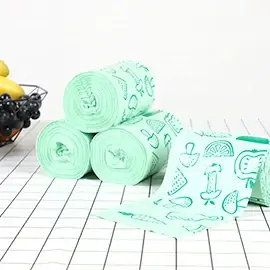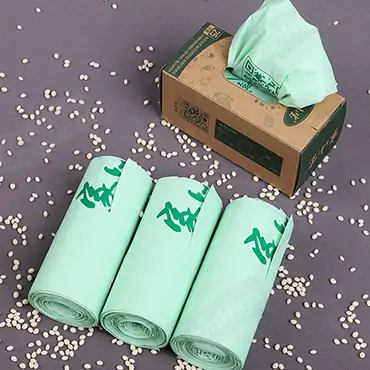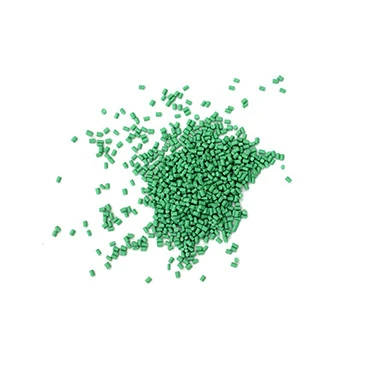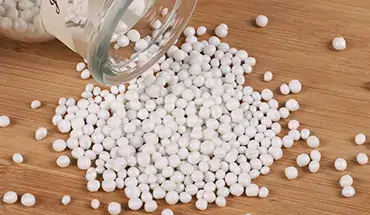Every single day, mountains of food scraps pile up from homes, restaurants, cafes, and businesses. However, where does most of it go? Straight into landfills seems simple enough. But food waste doesn’t just disappear. It becomes a festering problem, a silent menace contributing to bigger environmental headaches.
You’ve probably seen them popping up more and more – those greenish, often plant-logo-stamped bags designed specifically for food scraps. Compostable bags for kitchen waste. They promise a cleaner, greener way to handle the unavoidable mess of peels, cores, leftovers, and coffee grounds. But amidst all the “eco-friendly” buzzwords, a crucial question arises, especially for businesses watching their bottom line and operational efficiency: Do you actually need them? Are they a genuine game-changer, or just another product vying for your purchasing budget?
We’ll explore the real impact of kitchen waste, clarify what makes a bag truly compostable, unpack the benefits for businesses, and guide you on making the right choice.
Why Managing Kitchen Waste Matters More Than Ever
It’s easy to underestimate the impact of that banana peel or those leftover pasta scraps. But multiply that by millions of households and businesses on a daily basis, the result is an overwhelming volume of organic waste heading to landfills.
The Landfill Challenge
Landfills aren’t designed for organic matter decomposition; instead, they’re primarily storage facilities. When food waste gets buried under layers of other trash, it’s cut off from oxygen. This anaerobic environment creates conditions that lead to the slow decomposition of food waste, which in turn releases methane—a greenhouse gas significantly more potent than carbon dioxide in the short term. Think of it like a pressure cooker for climate change contributions, silently bubbling away beneath the surface. Plus, landfills take up valuable space, and finding new sites is becoming increasingly difficult and contentious.
The Ripple Effects of Untreated Food Scraps
Beyond the greenhouse gas issue, untreated food waste in landfills is basically an open invitation for pests. Flies swarm, breed, and potentially carry bacteria to other areas. Rodents find a feast. The leachate can potentially contaminate soil and groundwater if landfill liners fail. It’s a messy, unhygienic situation that creates a chain reaction of potential health and environmental hazards. Simply bagging food waste in traditional plastic only delays the inevitable and adds another layer of non-degradable material to the mix.
Are Compostable Kitchen Bags a Must-Have?
While perhaps not “necessary” in the absolute sense (you could theoretically transport loose food scraps), using compostable bags for kitchen waste shifts from being a niche eco-choice to a practical necessity for efficient, hygienic, and genuinely sustainable organic waste management. Here’s the breakdown:
- They Enable Effective Composting: They make collecting and transporting food scraps significantly easier and cleaner for households, businesses, and municipal collection services. Without them, participation in composting programs often drops due to the “ick factor.”
- They Protect Compost Quality: They ensure only compostable materials end up in the compost stream, preventing contamination from conventional plastics that ruin the final compost product.
- Regulations & Expectations are Shifting: Many municipalities are implementing or expanding organic waste diversion programs, sometimes mandating the use of certified compostable liners. Furthermore, consumers and clients increasingly expect businesses to demonstrate environmental responsibility. Using the right bags is a visible and impactful way to do this.
- Operational Efficiency: For businesses (restaurants, cafes, offices), they streamline waste sorting, improve kitchen hygiene, and reduce odors, contributing to a better working environment.
So, while you could manage without them, doing so efficiently, hygienically, and in line with growing environmental expectations is much harder. They are the key enablers for widespread, successful organic waste diversion.
The Benefits of Using Compostable Bags for Kitchen Waste
Using compostable kitchen waste bags is crucial. Let’s explore the advantages of this sustainable choice:
Environmental Impact
Compostable bags represent a substantial advancement in reducing the carbon footprint associated with waste management. Made from biobased materials such as corn starch and potato starch, their production consumes less energy and results in lower greenhouse gas emissions. When these bags decompose in composting facilities or properly managed compost heaps, they break down into carbon dioxide, water, and biomass without leaving any toxic residue. In contrast, plastic bags can take hundreds of years to degrade in landfills and may release methane—a potent greenhouse gas—when decomposing anaerobically.
By switching to compostable bags, individuals and communities can significantly decrease their environmental impact. These bags not only divert organic waste from landfills, thus reducing methane emissions, but they also support the circular economy by transforming waste into valuable compost that enriches the soil. Adopting compostable bags is a practical step toward sustainability, offering a viable solution to lower our carbon footprint, minimize dependency on fossil fuels, and mitigate the impact of waste on climate change.
Contribution to Composting
Compostable food waste bags play a vital role in improving the composting process, thus enhancing the efficiency and environmental benefits of organic waste recycling. These bags decompose under specific composting conditions, making it easy to collect and transport food scraps and other biodegradable waste to composting facilities or home composting systems.
Additionally, compostable bags maintain the integrity of the compost by eliminating non-biodegradable materials that can contaminate the soil and harm plant life. This is particularly beneficial in urban environments where composting space is limited and in municipal composting schemes aimed at increasing resident participation.
By facilitating the separation of organic waste and its conversion into nutrient-rich compost, compostable food waste bags support soil health and promote plant growth, thereby enhancing the quality of compost.
Convenience and Hygiene
Compostable kitchen waste bags offer significant convenience and hygiene benefits, particularly in managing household organic waste. Specifically designed to dispose of kitchen scraps and food waste more hygienically than traditional plastic bags, these compostable alternatives integrate organic waste disposal into everyday life.
Their durable design allows users to fill the bags directly with food scraps, peels, and other compostable materials without worrying about leaks or tears. This helps maintain a clean kitchen environment and reduces the risk of attracting pests such as insects and rodents, which are drawn to food waste.
Furthermore, compostable bags can reduce unpleasant odors by allowing moisture to evaporate and slowing down the decomposition process inside the bag. This feature is beneficial for maintaining a hygienic kitchen atmosphere until the waste can be composted or taken to a collection point.
These bags decompose completely in a compost environment without leaving harmful residue behind, offering an eco-friendly approach to managing kitchen waste. By opting for compostable kitchen trash bags, families can actively participate in larger environmental initiatives while enjoying cleanliness and ease of use.

How to Choose Compostable Bags for Kitchen Waste
Given the numerous benefits of using compostable garbage bags, many sustainability advocates and businesses are turning to this eco-friendly waste disposal option. Here’s how to choose the right compostable organic waste bags:
Certifications and Standards
Look for certified compostable bags, such as those that meet ASTM D6400, EN 13432, and OK compost standards. These certifications are usually printed on the bag’s surface, ensuring the product meets rigorous environmental criteria.
Composting Conditions
When selecting kitchen waste bags, check if they are compatible with household and industrial composting. Depending on the composting conditions, consider the raw materials, thickness, and size of the product. Focus on the product’s degradability and shelf life to get the most out of your investment.
Cost Comparison
While the cost of compostable bags may be higher than traditional alternatives, their long-term environmental benefits can outweigh the expense. Compare the price of compostable kitchen bags with regular food waste bin liners. Remember, their composting properties and positive environmental impact often justify the initial higher cost.
By considering certifications, composting conditions, and cost comparisons, you can find the ideal products for your needs.
Practical Tips for Using Compostable Bags in the Kitchen
Incorporating compostable bags into your kitchen’s daily organic waste management can enhance their effectiveness and ensure a smooth transition from traditional waste disposal methods. Here are some practical tips:
- Store bags properly: Keep compostable bags in a cool, dry place to maintain their integrity before use. Exposure to humidity or heat can start the degradation process prematurely.
- Avoid overfilling: Prevent leaks and tears by avoiding overfilling the bag, especially when dealing with wet waste or if the bag will be used for an extended period. Consider using a double bag for added strength.
- Control odors: Remove excess liquid before disposing of food scraps to maintain the bag’s strength and reduce odors.
- Secure the bag: Close the bag firmly when full and remove it from the kitchen immediately to control odors and pests.
Conclusion
In the pursuit of a more sustainable lifestyle, choosing compostable bags for kitchen waste is a critical decision. Compostable bags break down into non-toxic, organic components, unlike traditional plastics that persist in ecosystems. By using compostable bags, we contribute to reducing landfill waste and harmful greenhouse gas emissions. This small change in daily routines can have a profound impact on waste management practices, promoting the cycle of natural decomposition and nutrient recycling.






